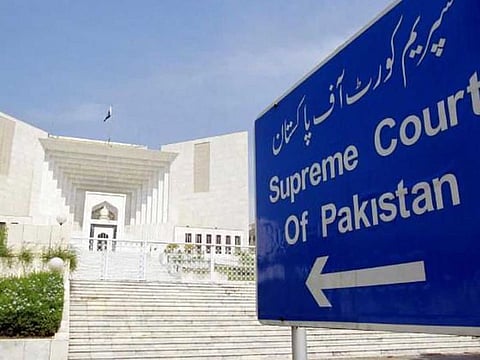Pakistan’s top court adjourns hearing on no-trust vote till April 4
Supreme Court hears arguments on crisis after no-trust dismissal, parliamenT dissolution

Islamabad: The Supreme Court of Pakistan heard arguments in one of the most significant cases in political history on Monday but adjourned the hearing till April 5.
Chief Justice Umar Atta Bandial took suo motu notice on Sunday on the dismissal of the no-trust vote against the prime minister in the parliament and the subsequent dissolution of the Nation Assembly that prompted a political and constitutional crisis in the country.
The five-member larger bench of Pakistan's top court, headed by Justice Bandial, is discussing whether Prime Minister Imran Khan had the legal right to dissolve parliament and set the stage for early elections. The Supreme Court heard arguments from both Khan's legal team and also the opposition parties but then adjourned the session until Tuesday.
PTI's counsel is Babar Awan while Farooq H. Naek is representing the PPP and other opposition parties. During the hearing, Justice Bandial observed that a debate before voting on the no-confidence motion did not take place despite being mentioned in the constitution.
Farooq H. Naek argued that the ‘threat letter’ of foreign conspiracy linked with the no-confidence motion on the basis of which the ruling was passed was never shown in parliament. However, the chief justice remarked that the opposition deliberately did not attend the parliamentary session called to discuss the contents of the document.
Opposition parties say the deputy speaker’s dismissal of the no-trust motion without a vote and the subsequent dissolution of the National Assembly are both “unconstitutional.”
While the speaker’s ruling and validity of any proceeding of the parliament cannot be questioned by any court under Article 69 of the Constitution, the court is discussing if the parliamentary proceedings “have been initiated on the basis of some illegality or unconstitutionality” in which case it can be called into question, Barrister Ahmed Pansota told Gulf News.
Pakistan is currently headed for fresh elections after the dissolution of the parliament. Imran Khan would continue to hold the office of the prime minister for the next 15 days and the general elections would be held within 90 days provided the Supreme Court verdict does not challenge the parliamentary proceedings.
Sign up for the Daily Briefing
Get the latest news and updates straight to your inbox



